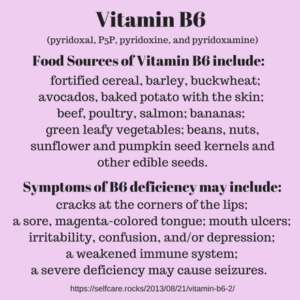Vitamin B6 (pyridoxal, pyridoxal-5-phosphate (P5P), pyridoxine, and pyridoxamine, ):
 Food Sources of Vitamin B6 include:
Food Sources of Vitamin B6 include:
- fortified cereal, barley, buckwheat;
- avocados, baked potato with the skin;
- beef, poultry, salmon;
- bananas;
- green leafy vegetables;
- beans;
- nuts; sunflower and pumpkin seed kernels.
Symptoms of a B6 deficiency may include:
- A severe deficiency of vitamin B6 may cause seizures;
- other neurological (nervous system or brain) symptoms affecting mental health may include irritability, confusion, and/or depression;
- the earliest signs of a B6 deficiency might be observed first in the mouth where the tongue may be swollen and painful and become smooth looking and have a bright magenta color; mouth ulcers and cracks or fissures at the corners of the mouth may also occur;
- and a weakened immune system may occur with a deficiency of vitamin B6.
-
Three B vitamins, B6, B12 and folate, are all necessary for the breakdown of homocysteine, which at elevated levels may increase risk of heart disease. So deficiency of any one of the three B vitamins, B6, B12 and folate, may be involved with symptoms or a diagnosis of heart disease.
-
Symptoms of PMS (Pre-menstrual Syndrome) and symptoms of prenatal nausea and vomiting may be helped by supplemental B6 intake. This suggests a deficiency may be involved in the underlying cause of the symptoms or that an increased need for the nutrient occurs before menstruation and during pregnancy. All B vitamins are important during pregnancy as they are involved in the growth of new cells and are needed for converting sugar into usable energy.
The skin & GI tract have a rapid cell growth rate which requires energy.
B vitamins are involved in both cell growth & energy metabolism.
B vitamins work together as a group to help breakdown the sugar glucose into a usable form of energy.
- http://umm.edu/health/medical/altmed/supplement/vitamin-b9-folic-acid, look up ATP and the Kreb’s cycle for more specific information about glucose metabolism.
Areas of the body that have a short life cycle for cells are the first areas affected by deficiency of B vitamins because new cells need energy to grow and the B vitamin group are also involved in other chemical reactions that are necessary for the growth of new cells. The lining of the intestinal tract can have a cell turnover rate of just one week and the tongue is part of the gastro-intestinal (GI) tract and has a similar quick rate of cell growth.
The skin at the corners of the mouth and the lips in general may also have a slightly quicker rate of cell turnover than other areas of the surface skin. Our outer skin and the lining of the GI-tract are similar and considered part of the same organ system.
- Both the outer skin and the lining of the GI tract are considered epithelial tissue: “the outer layer of your skin is an epithelial tissue, and so is the lining of your small intestine.” https://www.khanacademy.org/science/biology/principles-of-physiology/body-structure-and-homeostasis/a/tissues-organs-organ-systems
-
Deficiency of several of the B vitamin group can cause changes in the appearance and surface texture of the tongue. Other B vitamins that can cause changes in the tongue are mentioned in the following excerpt and include “niacin (B3), riboflavin (B2), pyridoxine (B6), folic acid (folate/B9), and vitamin B12”:
“Deficiencies of niacin, riboflavin, pyridoxine, folic acid, or vitamin B12, resulting from poor diet or from the administration of antagonists, may cause a sore, beefy-red tongue without a coat. In the chronic vitamin deficiency state, the tongue may become atrophic and smooth.” – “The Tongue – Clinical Methods – NCBI bookshelf https://www.ncbi.nlm.nih.gov/books/NBK236/
Pyroluria:
Pyroluria may be a genetic problem that causes increased urinary loss of B6 and zinc for some people. For patients with the condition adequate amounts of the nutrient cannot be readily obtained from food sources and large dose supplements are needed on a daily basis of both vitamin B6 and the mineral zinc. The condition is generally not assessed for or treated by the current medical system as it is not easy to diagnose. Anxiety is a primary symptom, migraine headaches and reduced tolerance for stress may also be symptoms. This post of mine has links and sources for more information: https://transcendingsquare.com/2014/09/22/pyroluria-anxiety-and-deficiency-of-b6-and-zinc/
This post by a medical doctor discusses the mental health and other symptoms in more detail. Emily Dickinson and Charles Darwin had similar symptoms. Daily supplements of zinc and B6 and/or the more bioactive form, pyridoxal-5-phosphate, (P5P), can quickly restore more normal health: http://www.judytsafrirmd.com/pyroluria-mental-health-and-the-immune-system/
Lack of dreaming at night is a symptom of pyroluria likely due to a long term deficiency of vitamin B6. Once treatment with the large dose supplements has been underway for a while it is common for patients to report remembering dreaming at night again. Whether the deficiency of B6 is causing less time to be spent at night in the stage of sleep when dreaming is more likely to occur, or whether it interferes with the ability to remember dreams the next morning, is not known.
Reference used for food sources & symptoms of Vitamin B6 deficiency:
- An Evidence-based Approach to Vitamins and Minerals: Health Benefits and Intake Recommendations, 2nd Ed., by J. Higdon & V. Drake, (Thieme, Stuttgart / New York, 2012) [Amazon]
- A description and source for purchasing the text: http://www.thieme.com/books-main/complementary-medicine/product/1040-an-evidence-based-approach-to-vitamins-and-minerals
- A review of the text: http://ajcn.nutrition.org/content/79/5/892.full
- The text is produced in cooperation with the Linus Pauling Institute. He is a researcher who used large doses of vitamin C to cure cancer tumors. His work was met with skepticism. More recently research supports his work in that a specific type of cancer cells is very susceptible to vitamin C – while to the rest of the body it is water soluble and non-toxic at the level that was toxic to the cancer cells. http://www.sciencedirect.com/science/article/pii/S2213231716302634
Other References used for the food sources of Vitamin B6:
- ars.usda.gov/SP2UserFiles/Place/12354500/Data/SR25/nutrlist/sr25a415.pdf
- http://www.dietandfitnesstoday.com/vitamin-b6-in-pumpkin-seeds.php
Disclaimer: Opinions are my own and the information is provided for educational purposes within the guidelines of fair use. While I am a Registered Dietitian this information is not intended to provide individual health guidance. Please see a health professional for individual health care purposes.
